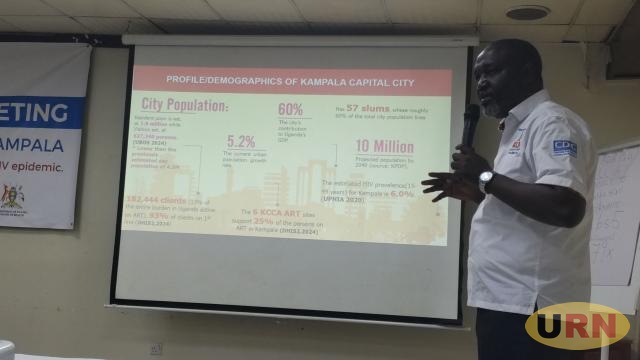
Kampala, Uganda | THE INDEPENDENT | Up to 2.2% of HIV tests done in health facilities in Kampala turned out positive for the virus, officials at the Kampala Capital City Authority (KCCA) have revealed.
This has raised a concern that cases are rising due to a shift to Airbnb, massage parlours and online apps to satisfy sexual desires.
Speaking at the HIV and TB review meeting held on Thursday, Dr Daniel Okello the KCCA Director in charge of Public Health said the capital city recorded 240,000 new cases of HIV last year and when recent tests were done to determine how long clients had been with the virus, 84% were found to had been infected a long time before they could seek testing services.
He explains that while previously sex work was known to be done on the streets, Airbnb where individuals rent out their homes to people looking for accommodations but adding sex as a perk or complementary service has become common and at the same time challenging to counter.
While they are grappling with the unregulated hospitality businesses including massage parlours that offer a service named “happy ending” to mean sex after massage, Okello says the city only has 502 out of the 2380 health facilities registered to offer HIV testing. Worse, a paltry 63 offer HIV treatment services making access to test and treatment services difficult.

Josephine Kaleebi the Executive Director of Reach Out Mbuya says they have resolved to storm such places as massage parlours with awareness messages, HIV treatments and condoms. Through such outreaches, she says a lot of young girls in Kampala have tested positive.
She however notes that while they try to link whoever they test positive into care immediately, some get lost along the way and yet some register wrong names making it hard for them to be traced to ensure that they remain in care. This is yet retention in care is not just good for treatment but also for prevention since individuals who are virally suppressed cannot spread the virus to their sexual partners.
Currently in Kampala, 95 percent of those living with the virus are tested, 95 per cent of those tested are on treatment and 97 percent of those on treatment are virally suppressed. Kaleebi says even if these figures look good, there is a need to fast-track a proposal by the Ministry of Health to use biometrics to track whoever is on Anti-retroviral therapies to ensure that they retain in care.
Okello calls for a new model that will allow private healthcare providers to also offer HIV/AIDS treatment. Currently only government-run and Private Not-for-profit hospitals offer such services and yet they account for only one percent of all health facilities in Kampala.
****
URN
 The Independent Uganda: You get the Truth we Pay the Price
The Independent Uganda: You get the Truth we Pay the Price



